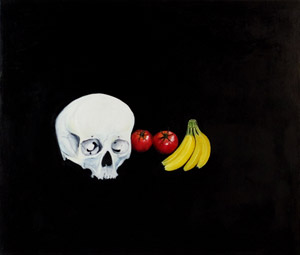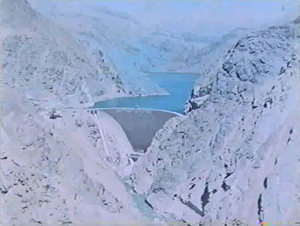
New Museum (5th Floor)
August 4 — September 26, 2010
235 Bowery
New York, NY
The Bidoun Library Project at the New Museum is a highly partial account of five decades of printed matter in, near, about, and around the Middle East. Arrayed along these shelves are pulp fictions and propaganda, monographs and guidebooks, and pamphlets and periodicals, on subjects ranging from the oil boom to the Dubai bust, the Cold War to the hot pant, Pan-Arabs to Black Muslims, revolutionaries to royals, and Orientalism to its opposites.
Most of the 700-odd titles on display were acquired specifically for this exhibition. The shape of the collection was dictated primarily by search terms on the World Wide Web rather than any intrinsic notion of aptness or excellence. Searching for “Arab,” “paperback,” “1970s,” and “<$3,” we acquired dozens of books about the Oil Crisis, the cruel love of the Sheikh, and the lifestyles of the nouveau riche. A similar search for “Iran” produced its own set of types and stereotypes. We did not set out to find the best books about, say, the Iranian revolution; in a sense, we looked for the worst. Or, rather, we tried to look at what was there.
The result is less a coherent group of titles or texts than an assortment of books as things, sorted roughly into four themes or units. Catalogues hang from the ceiling in front of each shelf cluster. Inside is a documentation of a selection of books from that shelf, in dialogue with excerpted texts and images from the library as a whole.
The Bidoun Library includes a program of Iranian film, video, and television culled from low-fidelity DVDs and VHS tapes that circulate among Iranians in the Diaspora. The selection includes post-revolutionary variety shows, music videos, and other totems of middlebrow—unibrow?—culture. This is an Iranian cinema unlikely to be shown at Lincoln Center.

New Museum (5th Floor)
August 4 — September 26, 2010
235 Bowery
New York, NY
The Bidoun Library Project at the New Museum is a highly partial account of five decades of printed matter in, near, about, and around the Middle East. Arrayed along these shelves are pulp fictions and propaganda, monographs and guidebooks, and pamphlets and periodicals, on subjects ranging from the oil boom to the Dubai bust, the Cold War to the hot pant, Pan-Arabs to Black Muslims, revolutionaries to royals, and Orientalism to its opposites.
Most of the 700-odd titles on display were acquired specifically for this exhibition. The shape of the collection was dictated primarily by search terms on the World Wide Web rather than any intrinsic notion of aptness or excellence. Searching for “Arab,” “paperback,” “1970s,” and “<$3,” we acquired dozens of books about the Oil Crisis, the cruel love of the Sheikh, and the lifestyles of the nouveau riche. A similar search for “Iran” produced its own set of types and stereotypes. We did not set out to find the best books about, say, the Iranian revolution; in a sense, we looked for the worst. Or, rather, we tried to look at what was there.
The result is less a coherent group of titles or texts than an assortment of books as things, sorted roughly into four themes or units. Catalogues hang from the ceiling in front of each shelf cluster. Inside is a documentation of a selection of books from that shelf, in dialogue with excerpted texts and images from the library as a whole.
The Bidoun Library includes a program of Iranian film, video, and television culled from low-fidelity DVDs and VHS tapes that circulate among Iranians in the Diaspora. The selection includes post-revolutionary variety shows, music videos, and other totems of middlebrow—unibrow?—culture. This is an Iranian cinema unlikely to be shown at Lincoln Center.
February 8, 2010


They Do Not Exist (Laysa lahum wujud)
Abu Ali Mustafa
Arabic with English subtitles
1974, 25 min
Directed by Mustafa Abu Ali in 1974, They Do Not Exist takes its title from the infamous Golda Meir quote. Abu Ali, one of the first Palestinian filmmakers and founder of the PLO’s film division, began making films in 1968 in Jordan, along with Sulafa Jadallah and Hani Jawhariya. After Black September, Abu Ali and the others had to leave Jordan but continued making resistance films in Lebanon.
Abu Ali’s contribution to Palestinian cinema is significant, as well as his contribution to international cinema. He worked with Jean-Luc Godard (who apparently has said his soul is Palestinian) on the film Ici et Ailleurs. Godard is “a great filmmaker; dedicated, creative and imaginative. We were both concerned to find the right film language appropriate to the struggle for freedom,” says Abu Ali.
Watch They Do Not Exist on UbuWeb
December 15, 2009
Tuesday, December 22 at 8:00 PM
Anthology Film Archives: 32 Second Avenue, New York, NY 10003

Bidoun is thrilled to co-present with Anthology Film Archives an encore screening of Ben Hayeem’s unmissable, unfathomable wonder. Born and raised in Bombay, Hayeem (1933-2004) made a number of well-regarded films and was close with experimental film pioneers Maya Deren and Slavko Vorkapich. Early in his career he joined the Living Theater group in New York and became the only Indian Jew to play a Chinese Priest with a Yiddish accent in a Brecht play. This comedic, cross-cultural experience must have set him down the path to the rather incredible and risque happenings in The Black Banana.
The original promotional notes inform us that, “In this zany, ribald Middle Eastern comedy, young Jews, Arabs and Texans revolt against the parental and conventional authority, represented by old-fashioned Jews, Arabs and Texans…Despite its message of peace and good will between Jew and Arab, The Black Banana has the distinction of being the only film ever banned in Israel because its mixture of nudity and religious satire offended the Israeli censorship board.”
The Black Banana will be preceeded by Ben Hayeem short films:
Papillote (1964, 10.5 minutes, 16mm)
Flora (1965, 6 minutes, 16mm)
Total running time: ca. 90 minutes.










